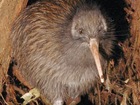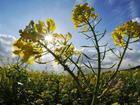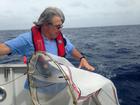Three female Asian elephants took up residence at the Smithsonian's National Zoo in Washington on Friday after a 2,500-mile (4,000-kilometer) road trip from western Canada.
Sri Lanka-born Kamala and Swarna, both 39, and Kamala's Canadian-born daughter Maharani, 23, are joining the National Zoo's own four elephants after a week traversing North America in two trucks accompanied by zookeepers and veterinarians.
 Full Story
Full Story
Environmentalists on Saturday welcomed Deutsche Bank's reluctance to invest in a major port expansion near Australia's Great Barrier Reef, saying it reflected global concern about the project.
Australia gave the green light to the major coal port expansion for India's Adani Group at Abbot Point on the Great Barrier Reef coast last year subject to strict environmental conditions.
 Full Story
Full Story
Japan successfully launched a new mapping satellite on Saturday that will be used to survey damage from natural disasters and changes affecting rainforests.
The Advanced Land Observing Satellite-2 (ALOS-2) will be able to see scars left by catastrophes such as Japan's 2011 tsunami as well as monitor progress made in reconstruction, officials from the Japan Aerospace Exploration Agency said.
 Full Story
Full Story
It's plunging back through space, but also back through time, and a band of veteran scientists are determined to save it: a lonely satellite from the age of disco, floating homewards without a mission.
The International Sun-Earth Explorer, or ISEE-3, was built in 1978 to study the physics of solar winds.
 Full Story
Full Story
Forecasters predict the 2014 Atlantic hurricane season will be "near or below average," thanks to an expected El Nino phenomenon, the National Oceanic and Atmospheric Administration said Thursday.
But the U.S. agency said residents in hurricane-prone areas should still be on their guard during the season, which stretches from June 1 to November 30.
 Full Story
Full Story
New Zealand's iconic kiwi is most closely related to the extinct elephant bird of Madagascar rather than the Australian emu as previously thought, researchers said Thursday.
The findings stem from a study by the University of Adelaide that was based on ancient DNA analyses of elephant bird bones at the Museum of New Zealand, Te Papa Tongarewa.
 Full Story
Full Story
Mobile solar-powered streetlamps made from old bicycle parts are transforming lives in Mali, where villagers often work by night to escape the heat despite 90 per cent having no mains electricity.
The project is the brainchild of Italian architect Matteo Ferroni, who visited the Segou region, 235 kilometers (150 miles) northeast of Bamako, in 2010 and noticed the locals were mainly sleeping during the searing day and getting up in the evening to work.
 Full Story
Full Story
The white mustard plant, having added spice to our lives for centuries, may soon be put to a very different use -- in the fight against chemical weapons, scientists said Wednesday.
Tests in the lab showed that mustard plants grown in soil contaminated with the deadly nerve agent VX, absorbed the toxin via its roots and held traces of it for at least 45 days.
 Full Story
Full Story
Australian researchers are working on fighting out-of-control bushfires with explosives, likening the process of using the soundwave produced by a blast to blowing out a candle.
 Full Story
Full Story
Exotic sea creatures called comb jellies may reshape how scientists view early evolution — as their genes suggest nature created more than one way to make a nervous system.
These beautiful but little-known translucent animals often are called "aliens of the sea," for good reason. Somehow, they rapidly regenerate lost body parts. Some even can regrow a very rudimentary brain.
 Full Story
Full Story



